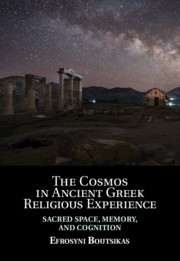Book contents
- The Cosmos in Ancient Greek Religious Experience
- The Cosmos in Ancient Greek Religious Experience
- Copyright page
- Dedication
- Contents
- Illustrations
- Graphs
- Tables
- Acknowledgements
- One Introduction
- Two Methodological Advances, Approaches, and Considerations
- Three Worship in Space and Time
- Four Astronomy and Perceptual Cognition in Apolline Cults
- Five The Cosmos in Manifestations of Identity, Memory, and Remembrance
- Six Cosmic Time in Greek Mystery Cults
- Seven Epilogue
- Appendix
- Glossary
- Notes
- References
- Index
- Plate Section (PDF Only)
Four - Astronomy and Perceptual Cognition in Apolline Cults
Published online by Cambridge University Press: 04 November 2020
- The Cosmos in Ancient Greek Religious Experience
- The Cosmos in Ancient Greek Religious Experience
- Copyright page
- Dedication
- Contents
- Illustrations
- Graphs
- Tables
- Acknowledgements
- One Introduction
- Two Methodological Advances, Approaches, and Considerations
- Three Worship in Space and Time
- Four Astronomy and Perceptual Cognition in Apolline Cults
- Five The Cosmos in Manifestations of Identity, Memory, and Remembrance
- Six Cosmic Time in Greek Mystery Cults
- Seven Epilogue
- Appendix
- Glossary
- Notes
- References
- Index
- Plate Section (PDF Only)
Summary
Apollo’s strong solar and calendric attributes make him a particularly suitable deity for an investigation concerning astronomical links in religious spaces.1 This relationship, which continues well into the Roman period,2 appears in a number of texts from the fifth century BCE.3 Many of Apollo’s epikleses associate him with the sun: Phoebus,4 Lykeios, Aigletes (god of light or sun, with a temple on the Aegean island of Anafi),5 and Apollo Eos (of the Dawn).6 In literature, the identification of Apollo as Helios (Sun) is widely attested, as are a number of cults linking the two divinities, such as Apollo Helios in Rhodes and Athens and the Boeotian Daphnephoria.7 We will explore in this chapter how a number of Apollo’s other cults employed solar associations for timekeeping purposes and for shaping the cognitive ecology of the cults, triggering the senses within the religious experience. The sun’s fundamental importance in human existence stands as testimony to Apollo’s cosmic significance. His importance in the Greek pantheon is well known, but the god’s cosmic role is, in addition, palpable in his position as the god of music, which also carried cosmological significance through the sixth-century-BCE Pythagorean ideas of the music of the spheres.8 Plato, in particular, explains how Apollo directs celestial and musical harmony.9 Of particular relevance to this study is a third association of Apollo with the cosmos, his relationship with the land of the Hyperboreans, the people of the far north: a place associated, at least in the late sources, with eternal spring and light,10 where days were of extreme length and nights very short – an ideal ambiance for the god of light.
- Type
- Chapter
- Information
- The Cosmos in Ancient Greek Religious ExperienceSacred Space, Memory, and Cognition, pp. 71 - 114Publisher: Cambridge University PressPrint publication year: 2020

